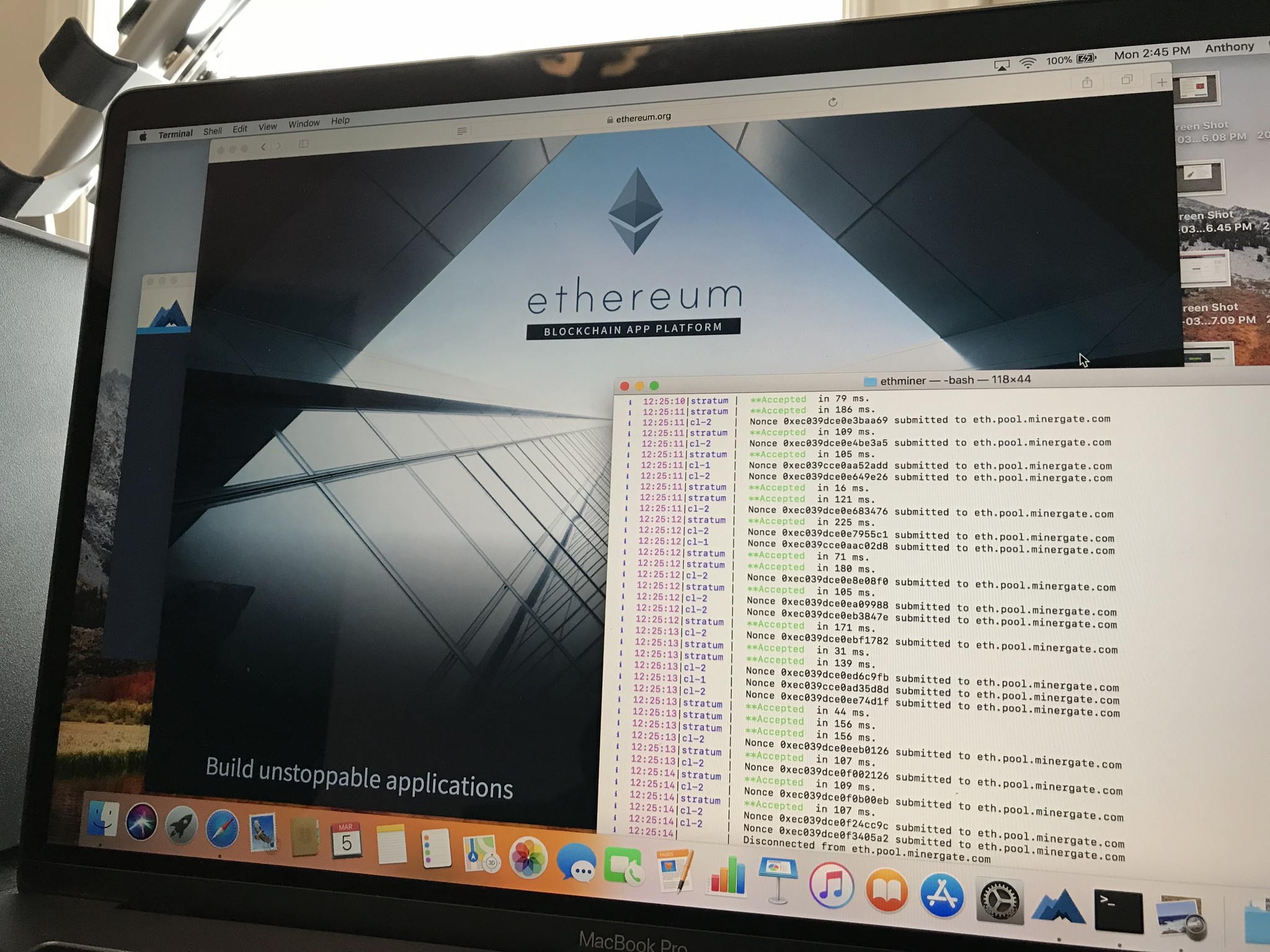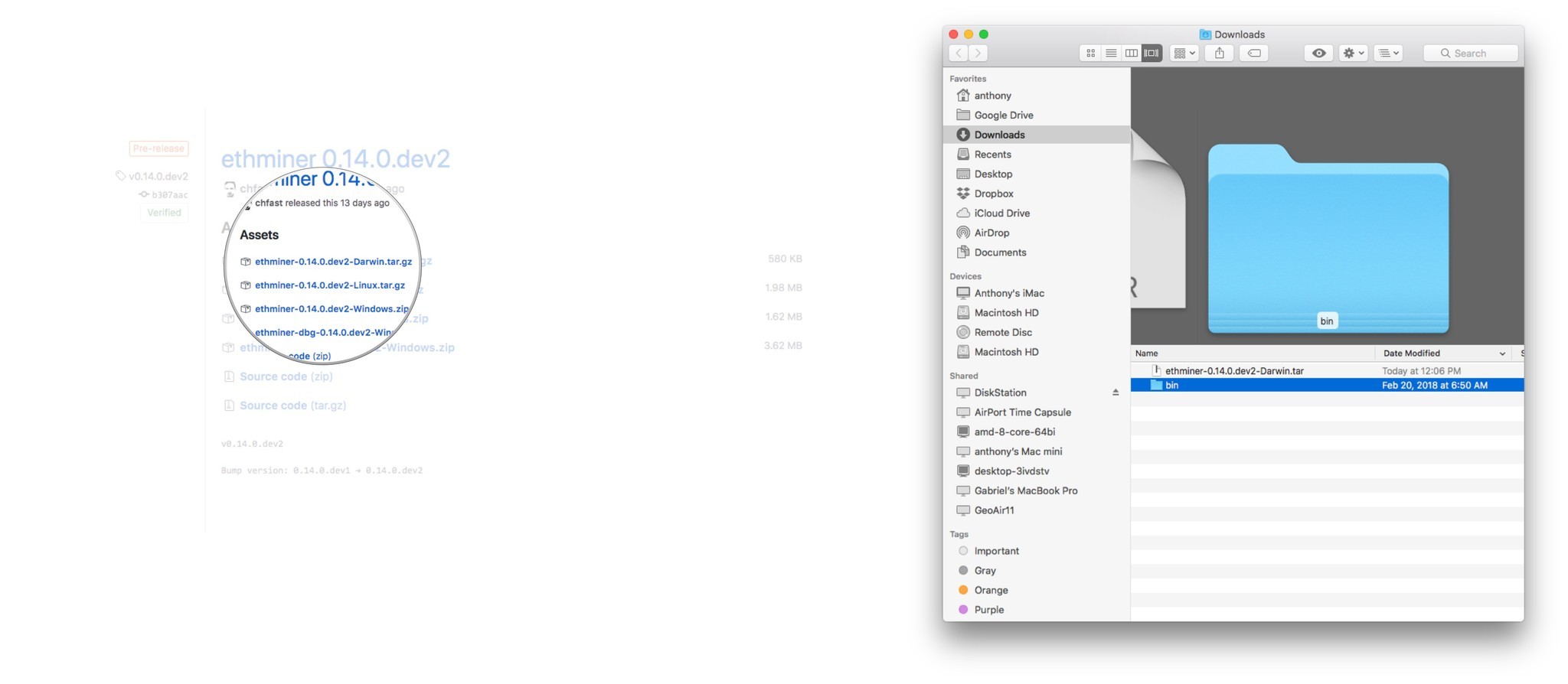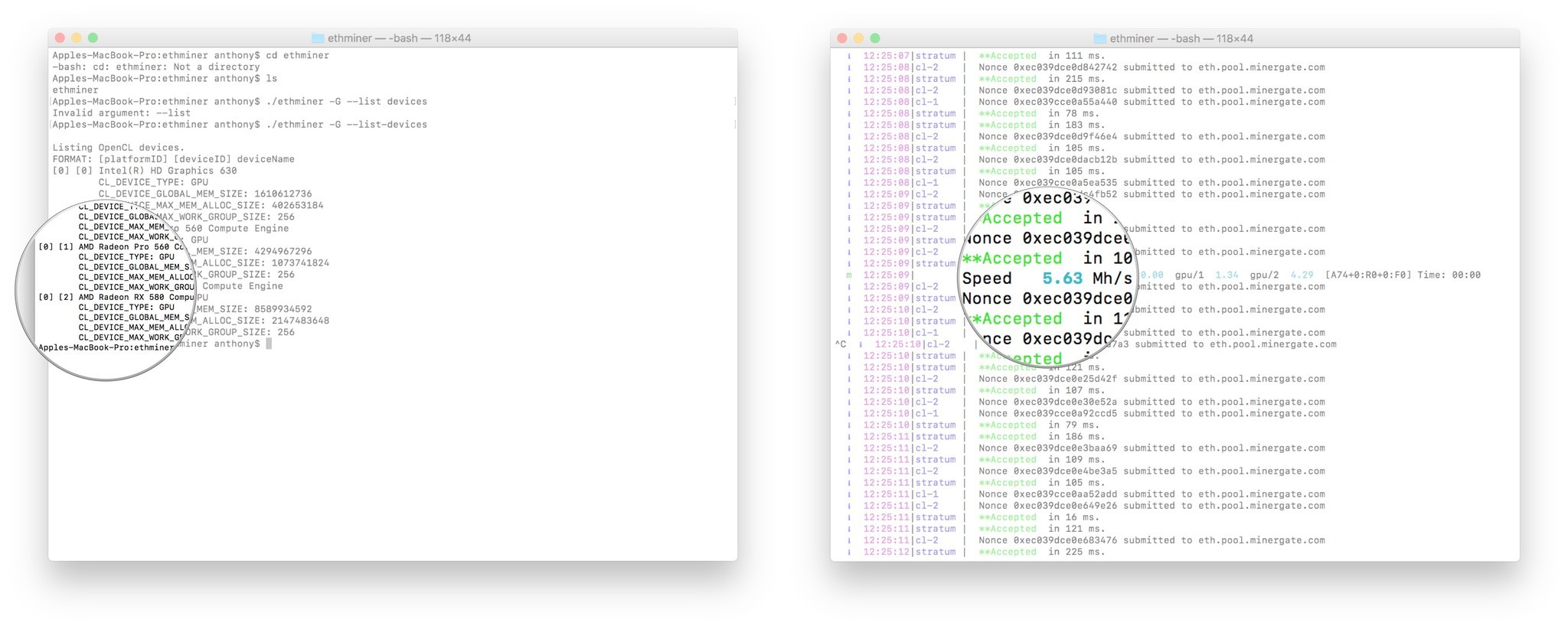How to mine Ethereum with your MacBook and eGPU graphics adapters

Digital currency like Bitcoin is no longer the sole parlance of informed netizens and is becoming mentioned more and more on mainstream information outlets. Although "mining" for Bitcoins via your PC has virtually become undoable without specialized hardware using an application specific chip created for bit mining, some less popular crypto-currency such as Ether on the Ethereum block-chain can still be done using your GPU hardware on your computer (although there is now talk that Ethereum too will soon require specialized hardware in the near future). I have a 2017 Skylake based MacBook Pro with a Radeon Pro 560 GPU and I have an eGPU with an AMD RX 580 GPU. Could I use my current hardware to make a couple of digital bucks on the side? Lets find out!
Some caveats, disclosures, and warnings
First and foremost, I am not an expert in digital currency by any means. I am not a financial adviser nor am I suggesting in anyway that you should or should not delve into the digital currency craze. I am simply demonstrating how you can use your Mac hardware to mine Ethereum.
Secondly, I am not getting into the security issues (and there are a few) on properly storing your private encryption keys for your digital wallet and how to properly and securely transfer your digital currency from banks or websites. My suggestion to you is to read everything before starting anything. Although I am not suggesting the following are the best or most reputable repositories of information, you can get started into your gathering of knowledge from sites such as 99bitcoins, buybitcoinworldwide, and MyEtherWallet.
My expectations
From everything I've read thus far, the best GPUs for mining are GPUs that have high compute capabilities with low power consumption. AMD desktop GPUs such as the RX 480 and the RX 580 are competitively sought after for these specific qualities. In fact, the GPU market is currently undergoing a bubble of inflated prices due to the current mining revolution.
Since the eGPU I have for creating VR applications of macOS sports an RX 580, I'm hoping that this component will offer some sort of profitability. According to this site:
The Radeon RX 480 is most arguably the most economical in terms of cost and saving electricity. Its power cost per day is significantly lower than the two that I have mentioned at $0.4320. Its hash rate is 25.0 MH/s, meaning its cost per MH/s is $7.96. This gives a return per day of $1.21 and therefore a return per year of $440.91. Radeon RX 480 will cost you $199.
And that's for an older model of my current hardware. Let's see what happens.
Getting started
Once you've figured out that you can responsibly manage and secure your digital wallet, it's time to get the software needed to start mining Ether.
Master your iPhone in minutes
iMore offers spot-on advice and guidance from our team of experts, with decades of Apple device experience to lean on. Learn more with iMore!
MinerGate account
First we will sign up with MinerGate. MinerGate is known as a digital mining pool where other digital miners connect to in order to use their collective computing capabilities to mine for various crypto-currency. I am not recommending MinerGate over any other mining pool. For our purposes of being able to easily connect to a mining pool via our software setup, MinerGate allows for a simple setup process that will get us going quickly.
- Navigate to MinerGate.
- Click Sign up.
- Sign up for a free account.
Now if you're interested in other crypto-currencies, you can optionally download the MinerGate client that gives you an easy to use GUI. The reason why we're not using the MinerGate GUI is because it doesn't detect my eGPU housing the RX 580. The RX 580 will be the workhorse of the setup theoretically so it's important to make certain that we're using it whilst mining.
Ethminer
Ethminer is an open source miner that will use the OpenCL computational capabilities in my AMD GPUs giving me better than CPU based computational capabilities. It's an application that runs in the command terminal so you'll need to get a bit dirty by casting off your GUI druthers.
- Navigate to the Ethminer GitHub.
- Navigate to Install.
- Click Releases.
- Download the latest darwin build. (ex. ethminer-x.x.x-Darwin.tar.gz)
- Open Finder.
- Navigate to Downloads.

- Double click the ethminer.x.x.x.darwin.tar download.
- Start Terminal from Spotlight Search.
- Type cd Downloads/bin.
Now we need to find out how our GPUs are enumerated on the computer.
- Type ./ethminer -G --list-devices.
- Press *return**.
If you have multiple GPUs, you'll notice all of them listed here. By default, ethminer will use all of the GPUs on your computer that use a similar compute function. In our case it will be using OpenCL. We're going to be using the MinerGate pool of eth.pool.minergate.com:45791. You can go to the MinerGate website for a full list of pool URLs. We'll also be using the account name we setup with MinerGate in this example it will be the email I used for account setup.
- Type ./ethminer -G -S eth.pool.minergate.com:45791 -0 your.account@email.com.
- Press return

And now we're off mining Ethereum!
Get ready for underwhelming performance
So for an RX 480 (a 580 in my case) we should be seeing a hash rate (basically how fast the computations are running) of 25.0 MH/s. My two AMD GPUs combined are only getting around 5.8 MH/s. I'm missing more than 80% of expected performance!
After a bit of digging, the culprit is likely the method of which my RX 580 GPU is connecting to my MacBook Pro. The eGPU enclosure that houses the RX 580 is connected via Thunderbolt 3 and as fast as that port is, the bandwidth is restricted to 1/4 the full x16 speed of a PCIe slot. So even if I had all 4 of my Thunderbolt 3 ports connected to eGPU enabled RX 580s, I still would not get the performance of a single RX 580 connected via a PCIe slot on a PC.
According to CryptoCompare, I should expect a return of $0.4658 per month! I'm rolling in the pennies! That's sarcasm folks in case you can't tell. I am so underwhelmed.
All joking aside, this bandwidth limitation also explains why gaming performance of my eGPU is so much worse than having the same GPU in a PC connected via PCIe.
You can, but you shouldn't
Although, technically, you can setup your MacBook Pro and eGPU to mine some crypto-currency, does it mean you should go through the bother of setting it up? No, probably not. If you re serious about mining crypto-currency the you're much better served getting hardware that will optimize your return. As of this writing, eGPU enclosures via Thunderbolt 3 will not give that to you. However, if you simply want to give mining a try-before-you-buy then seeing how comfortable you are with the setup on a Mac is a good place to start as a learning experience.
Thoughts and comments
What's your take on mining on a Mac? How about mining in general? If you have any questions, comments, or suggestions, let us know in the comment section!

